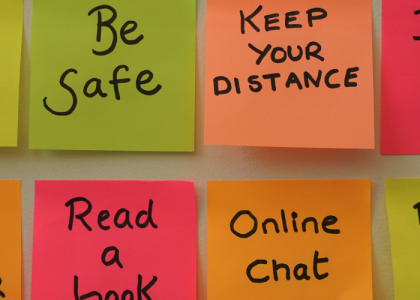How businesses can help remote workers with their mental health

The COVID-19 pandemic has caused a big shift in the way we work, with an estimated 20 million people now working from home full-time and part-time in the UK.
While more than 60% of people want to stay working from home after COVID-19, this unprecedented change brings new stresses, issues and challenges ahead.
“We live in an age where we can make use of virtual connections and video conference software to stay in touch with each other,” says Mark Vahrmeyer, a practitioner at Brighton & Hove Psychotherapy “my profession – psychotherapy – has shifted overnight to online working to ensure the continuity of therapy sessions. This is a positive but it will not migrate the tsunami of mental health and relationship problems that will arrive through COVID-19”.
Working remotely has its benefits, including flexibility and no commuting; however, being sedentary and replacing a social office environment with isolated days at home can easily lead to issues with mental health. Businesses need to be prepared to help with these new challenges, to ensure their employees stay safe and well.
Here are a few ways businesses can help home workers with their mental health, during COVID-19 and in the future.
Take your meetings online
Working from home alone instead of socialising with other staff in an office can leave employees feeling disconnected, with loneliness being a leading cause of low mood and stress. Taking your meetings online is a great way to help staff feel connected, and virtual communication can be just as a good for your mental health as in-person communication.
Businesses should be encouraging consistent virtual meetings between team members, to ensure regular contact and give employees a chance to voice any concerns. Using video call software such as Zoom and Skype makes keeping in touch easy. It’s a great way to socialise with colleagues, too - almost 80% of people say that socialising in the office is one of the main things they miss about working from home.
Managers should check in regularly
Managing remote staff can be different to what you’re used to. Managers will need to step up and change the way they work in order to look after their staff, including regularly checking-in with team members individually. Emails and texts lack non-verbal cues, making it difficult for the conversation to progress or even leading to miscommunication. One-to-one phone calls and videos give both managers and employees the chance to express concerns, have ad hoc discussions and build or continue rapport.
Promote physical health
Working from home can become very sedentary thanks to long hours at a desk, which can lead to poor health both physically and mentally. Businesses should encourage employees to take care of their physical health, and ensure they know the importance of daily exercise and eating a balanced diet. Remind your staff to keep active, whether that be enjoying a walk outside during their lunch break, or ensuring they have a small break from their screens regularly.
Encourage a strong work-life balance
The flexibility and convenience of working from home may sound enticing, but studies have suggested that working remotely can lead to a worse work-life balance. Some employees find it difficult to keep up motivation, while others struggle to switch-off and differentiate between working and unwinding in their home. Long term, this could become a big problem for many businesses as their staff begin to feel overworked or unproductive.
When in the office, staff have regular breaks naturally, including socialising with other employees or making a cup of tea, while at home it is easy to forget how these short interludes can aid our mental health. Managers, therefore, need to encourage staff to plan short breaks into their working day and promote a better work-life balance. Check-in with your employees and make sure they are signing off at the end of the working day, as well as keeping up any hobbies and taking time to relax.
Be flexible
Another way to guarantee an appropriate work-life balance is to remove the rigid 9-5 structure and allow employees to create their own schedule. People naturally differ when it comes to productivity at certain parts of the day, and so allowing your staff to create their own schedules can increase efficiency and help employees feel happier and healthier. Managers must also consider external distractions, including family life – allowing parents to work during school hours means they won’t feel under pressure to balance both at the same time.
Final thoughts
Working remotely is an entirely new experience for many businesses and workers, with lots of new challenges to face. COVID-19 has already made a big impact on mental health, and so it is worthwhile for businesses to focus on ways to ensure their employees’ new working-from-home life is as stress-free as possible.
By encouraging a healthy work-life balance, allowing flexibility, and keeping in touch regularly over the phone or video call, companies can find small yet impactful ways to keep up morale and guarantee they are looking after their staff’s mental health.


